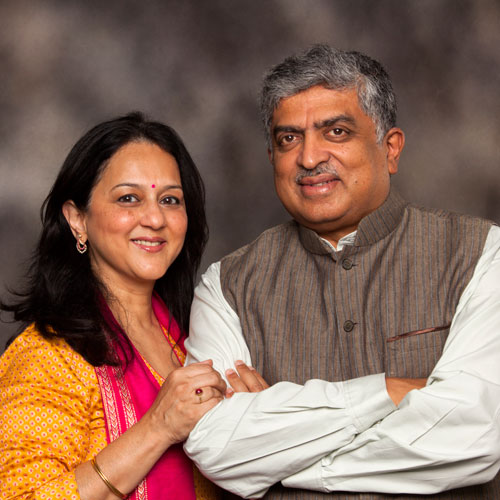
Rohini and Nandan Nilekani
We thank Bill and Melinda for creating this unique opportunity to realise a moral aspiration inspired by the Bhagwad Gita – Karmanye Va dhikaraste Ma Phaleshu Kadachana, Ma karma phalaheturbhurma Te Sangostvakarmani. We have a right to do our duty but no automatic right to the fruits from the doing. It is critical that we do not slip into inaction fearing that we may not be able to reap direct reward. It is to this ideal that we pledge."
Pledge letter
| Wednesday, 8 November 2017
In our 21st century world, we hear of dizzying new frontiers opened up through the new sciences. The latest technologies allow us to see deeper into space, and farther into the oceans. We experience renewed wonder at the tiniest of organisms, thriving in the harshest places on Earth, or found to be influencing brain states from inside our own bodies! We feel awed. We are buoyed by the potential of human innovation. By discoveries that can prevent and cure disease; that can bring the world’s knowledge into the palm of every hand; that allow all humans to connect, to understand, to explore. We hope that prosperity for all might be right around the corner. We feel grateful for decades of relative stability and peace in the world.
On the flip side, we see, too, that inequality is increasing sharply in most countries. We see the young and the restless in this interconnected globe, unsure of their future, wanting more but anticipating less. We see a growing politics of polarization, of divisions, of brinksmanship. It is as if the world holds its breath.
What should we do at this time? That is a question every citizen must ask. Those of us who have wealth beyond all our wants must ask that very sharply. Wealth comes with huge responsibility and is best deployed for the larger public interest. So what must the super-wealthy do?
We believe that there is a huge opportunity to open up that question in a creative and collaborative way. No matter who we are, how we have generated our wealth or what ideologies we espouse, we all face the same situation: our desire to give forward is collectively growing, but our ability to create sustainable change is just not keeping pace. We have the resources, the vision, and the skills to create large-scale market institutions. Yet, when it comes to social change, we learn it is tougher. Something eludes us. Things do succeed, but not fast enough or with sufficient impact. We feel good about trying, but we despair at emerging challenges.
The rapid transformation we all seek needs widespread public support. People want change they can believe in, that they can be a part of and most importantly, contribute to. How could we better deploy our financial, technological and social resources to achieve this?
Nandan’s corporate experience, and his work at population scale on India’s Unique ID project, plus Rohini’s decades of work at the intersection of samaaj (society), bazaar (markets) and sarkaar (state), has led us to the idea of societal platforms as one of many ways forward. Societal platforms are open, technology-enabled ecosystems or nurturing networks. Built on an elegant yet light digital infrastructure, they design spaces for cocreation and participation by all entities with a stake in positive change – from state institutions and entrepreneurs to non-profits or individual citizens. They are imagined as a public good with a combination of high technology, high collaboration and high touch.
This idea is inspired by the earlier work of many visionaries and philanthropists. We are excited by our initial experimentation with societal platforms in early education, and see immense potential for scaling up diverse solutions. We do remind ourselves, though, of what John Adams wrote to Thomas Jefferson – “Power always thinks it has a great soul… there’s great danger that I will fall in love with my own virtue.”
Accepting this truth with humility, we still feel energised to use our many privileges to get engaged with intractable social issues! By joining the Giving Pledge, we hope to learn from its signatories to explore “societal platforms” and more.
We thank Bill and Melinda for creating this unique opportunity for so many people to realise a moral aspiration inspired by the Bhagwad Gita- “Karmanye Va dhikaraste Ma Phaleshu Kadachana, Ma karma phalaheturbhurma Te Sangostvakarmani”. This verse reminds us that we have a right to do our duty but no automatic right to the fruits from the doing. So it is the idea of action itself that should motivate us much more than the ego-driven desire for its results. It is also critical that we do not slip into inaction fearing that we may not be able to reap direct reward.
It is to this ideal that we pledge. |


